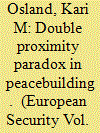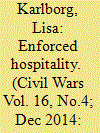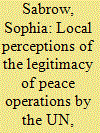| Srl | Item |
| 1 |
ID:
168967


|
|
|
|
|
| Summary/Abstract |
This contribution increases the understanding of the EU's role in post-conflict settings by exploring perceptions of EULEX by local rule of law experts. Drawing on critical peacebuilding and the decline of normative power Europe literatures, we develop an analytical framework, underlining the importance of the intention–implementation gap and the implementation–perception gap in understanding how EU missions are perceived. By comparing local expert narratives to those of EULEX judges, prosecutors, and legal officers, we contend that the core problem for the negative perception of the mission results from what we call the double proximity paradox in peacebuilding. The first paradox is one of implementation and transpires when an actor commits substantial resources to address structural problems in a post-conflict territory due to its centrality for its own interests, but fails to uphold its commitment as its immediate interests can only be achieved through agents who contribute to these problems. The second paradox relates to perception and transpires as high commitments raise expectations of structural impact. The visibility of the actor's investment makes any implementation failures more tangible. The actor is therefore, paradoxically, the most open to criticism in a territory where it is doing the most.
|
|
|
|
|
|
|
|
|
|
|
|
|
|
|
|
| 2 |
ID:
141473


|
|
|
|
|
| Summary/Abstract |
While local mission legitimacy has prompted intense political and academic attention in the context of peace operations, our grasp of how host citizens understand the legitimacy of international troops remains limited. This article explores how Afghan citizens perceive the legitimacy of International Security Assistance Force (ISAF) troops. A qualitative analysis of in-depth interviews and focus group discussions with citizens in Kabul deepens our understanding of how ideational and security-related concerns interact and shape local perceptions of legitimacy through two oppositional discursive frames: a liberation frame and an occupation frame. The findings suggest that local mission legitimacy builds on the perceived will and capacity of ISAF troops to help and protect Afghans in ways that are in accordance with Afghan, most notably Islamic, ways of life. The article concludes that ISAF troops are widely perceived to have failed on both ideational and security-based grounds.
|
|
|
|
|
|
|
|
|
|
|
|
|
|
|
|
| 3 |
ID:
151528


|
|
|
|
|
| Summary/Abstract |
This paper addresses two issues that have only been marginally discussed in the literature about peace operations: First, it investigates the legitimacy of peace operations from the perspective of populations of states that receive them. Secondly, it assesses how host populations perceive different types of peace interventions; by the UN, by a regional organization and by an individual state. A conceptual framework of the local legitimacy of peace operations is applied to an analysis of the perceptions of the French, ECOWAS and UN interventions in Mali in 2013–14. Local perception was measured by an analysis of Malian newspaper articles and interviews with (mainly southern) civil society actors. The results suggest that local actors negotiate between pragmatic and ideological conceptions of legitimacy. While French forces are pragmatically valued for their military achievements, they receive little ideological legitimacy. The regional force has high ideological legitimacy but disappoints in its performance on the ground. The UN force scores low in ideological legitimacy and is ambiguous in terms of pragmatic legitimacy.
|
|
|
|
|
|
|
|
|
|
|
|
|
|
|
|